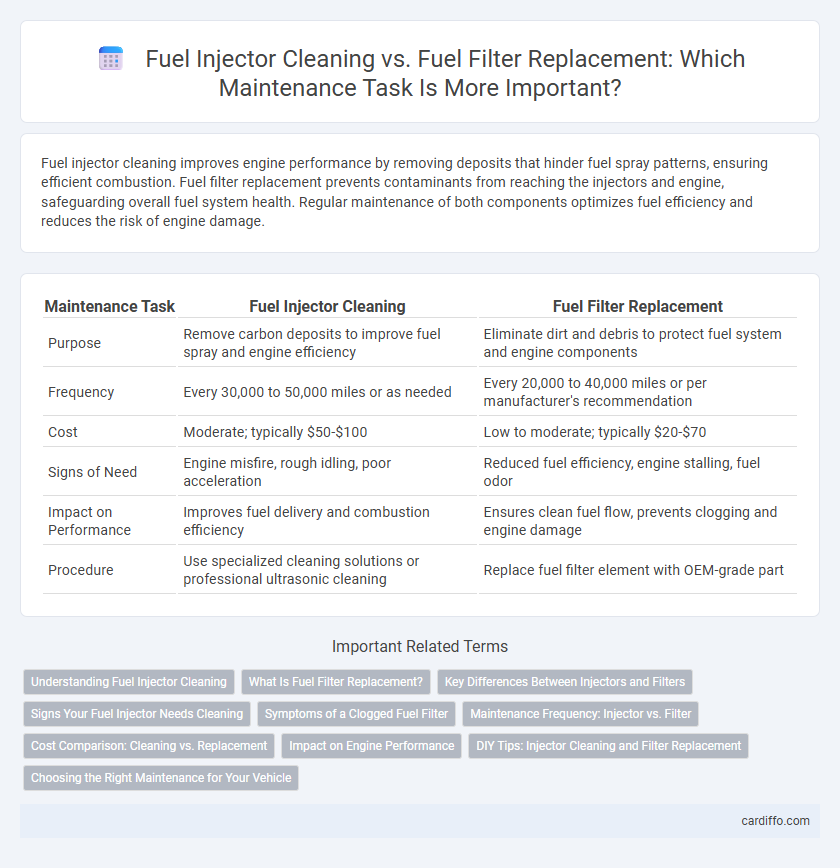Fuel injector cleaning improves engine performance by removing deposits that hinder fuel spray patterns, ensuring efficient combustion. Fuel filter replacement prevents contaminants from reaching the injectors and engine, safeguarding overall fuel system health. Regular maintenance of both components optimizes fuel efficiency and reduces the risk of engine damage.
Table of Comparison
| Maintenance Task | Fuel Injector Cleaning | Fuel Filter Replacement |
|---|---|---|
| Purpose | Remove carbon deposits to improve fuel spray and engine efficiency | Eliminate dirt and debris to protect fuel system and engine components |
| Frequency | Every 30,000 to 50,000 miles or as needed | Every 20,000 to 40,000 miles or per manufacturer's recommendation |
| Cost | Moderate; typically $50-$100 | Low to moderate; typically $20-$70 |
| Signs of Need | Engine misfire, rough idling, poor acceleration | Reduced fuel efficiency, engine stalling, fuel odor |
| Impact on Performance | Improves fuel delivery and combustion efficiency | Ensures clean fuel flow, prevents clogging and engine damage |
| Procedure | Use specialized cleaning solutions or professional ultrasonic cleaning | Replace fuel filter element with OEM-grade part |
Understanding Fuel Injector Cleaning
Fuel injector cleaning restores optimal spray patterns and fuel atomization, enhancing engine performance and fuel efficiency. Unlike fuel filter replacement, which prevents contaminants from entering the fuel system, injector cleaning directly removes deposits from fuel injectors. Regular maintenance of fuel injectors reduces rough idling, misfires, and emissions, ensuring smoother combustion and prolonging engine life.
What Is Fuel Filter Replacement?
Fuel filter replacement involves removing and installing a new filter to ensure contaminants are effectively trapped, preventing debris from reaching the fuel injectors and engine. This maintenance step is essential for preserving fuel system efficiency, protecting engine components, and maintaining optimal fuel flow and combustion. Regular fuel filter replacement helps avoid clogged injectors and poor engine performance caused by dirt and impurities in gasoline.
Key Differences Between Injectors and Filters
Fuel injector cleaning involves removing deposits from the injector nozzles to ensure precise fuel atomization and optimal engine performance, while fuel filter replacement focuses on removing contaminants from the fuel before it reaches the engine. Injectors directly control fuel delivery to the combustion chamber, impacting fuel efficiency and emissions, whereas filters protect the entire fuel system by preventing particles and debris from entering the injectors and engine. Proper maintenance of both components is essential for maintaining engine reliability and preventing performance issues.
Signs Your Fuel Injector Needs Cleaning
Signs your fuel injector needs cleaning include rough engine idling, decreased acceleration, and poor fuel efficiency. Black smoke from the exhaust and engine misfires also indicate clogged or dirty fuel injectors. Regular inspection and cleaning of fuel injectors improve engine performance and prevent costly repairs.
Symptoms of a Clogged Fuel Filter
Symptoms of a clogged fuel filter include engine misfires, reduced acceleration, and difficulty starting the vehicle due to restricted fuel flow. A clogged fuel filter can cause uneven fuel pressure, leading to poor engine performance and potential stalling under load. Unlike fuel injector cleaning, which targets spray pattern and combustion efficiency, fuel filter replacement directly addresses debris blockage that impedes fuel delivery.
Maintenance Frequency: Injector vs. Filter
Fuel injector cleaning is typically recommended every 30,000 to 50,000 miles to ensure optimal spray patterns and engine performance. Fuel filter replacement usually occurs more frequently, about every 20,000 to 30,000 miles, to prevent contaminants from clogging the fuel system. Maintaining the correct service intervals for both components is crucial to avoid engine misfires, poor fuel economy, and reduced horsepower.
Cost Comparison: Cleaning vs. Replacement
Fuel injector cleaning typically costs between $50 and $150, making it a more budget-friendly option compared to fuel filter replacement, which ranges from $100 to $300 including parts and labor. While fuel injector cleaning improves engine performance by removing carbon deposits, fuel filter replacement ensures optimal fuel flow by removing contaminants from the fuel system. Choosing between the two depends on the specific maintenance need and vehicle condition, with cleaning generally offering lower upfront costs but filter replacement providing longer-term fuel system protection.
Impact on Engine Performance
Fuel injector cleaning restores optimal spray patterns, enhancing combustion efficiency and improving throttle response, which directly boosts engine performance. Fuel filter replacement ensures clean fuel delivery by preventing contaminants from clogging fuel injectors and reducing engine power loss. Neglecting either service can lead to poor engine efficiency, increased emissions, and potential long-term damage.
DIY Tips: Injector Cleaning and Filter Replacement
Regular fuel injector cleaning enhances engine performance by removing deposits that hinder fuel flow, while fuel filter replacement prevents contaminants from reaching the injectors and engine. Use specialized injector cleaning kits with fuel additives or ultrasonic cleaning methods for effective DIY injector maintenance. Replace fuel filters every 20,000 to 30,000 miles to ensure optimal fuel system health and prevent clogging that can reduce fuel efficiency.
Choosing the Right Maintenance for Your Vehicle
Regular fuel injector cleaning enhances engine performance by ensuring efficient fuel atomization and combustion, while fuel filter replacement prevents contaminants from reaching the injectors and fuel system. Selecting the right maintenance depends on diagnosing symptoms like poor acceleration or engine misfires, which indicate injector issues, versus clogged filters causing reduced fuel flow. Prioritizing timely fuel filter replacement extends injector life and optimizes fuel efficiency, creating a balanced maintenance approach for longevity and vehicle reliability.
Fuel injector cleaning vs fuel filter replacement Infographic

 cardiffo.com
cardiffo.com